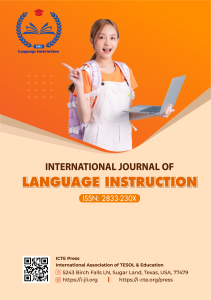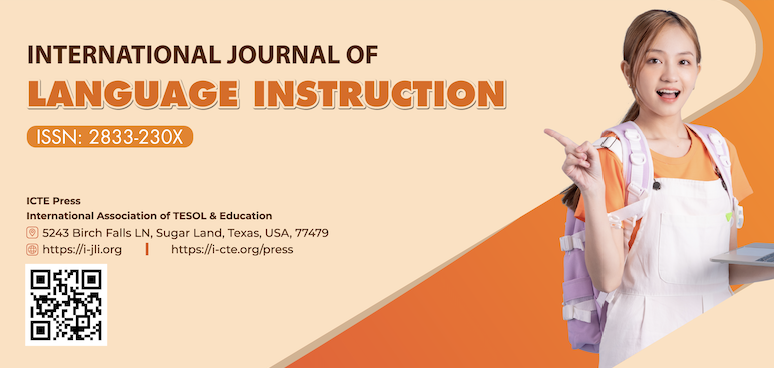Vol. 3 No. 4 (2024): Language Instruction
 Dear Language Instructors,
Dear Language Instructors,
We are delighted to announce the publication of Volume 3, Issue 4 (2024) of the International Journal of Language Instruction (IJLI). This issue continues our mission to advance research and practices in English Language Teaching (ELT) and English as a Medium of Instruction (EMI), offering valuable insights into innovative teaching approaches, challenges, and emerging trends in language instruction worldwide.
This issue features a diverse collection of high-quality articles that address schema-building activities for listening comprehension, digital storytelling, emotional regulation of teachers, cultural adaptation, and the use of digital tools and EMI courses. Together, these contributions highlight innovative methodologies, critical reflections, and practical implications for educators, researchers, and policymakers in the field of language instruction.
In this issue, Bui (2024) examined the impact of schema-building activities on EFL learners’ listening comprehension at a Vietnamese university. Involving 123 students, the experimental study utilized pretests, posttests, questionnaires, and observations. Results revealed significant improvements in listening skills, increased learner motivation, and greater engagement. Schema-building activities proved effective in enhancing comprehension and fostering active participation in listening instruction.
Ngo (2024) investigated novice EFL teachers’ emotional regulation in response to student misbehavior at a Vietnamese university. Using classroom observations, interviews, and reflective journals, findings revealed frustration and disappointment caused by discipline issues and disengagement. Teachers managed emotions through reappraisal, attention redirection, and sharing strategies, ensuring effective teaching and fostering a positive classroom environment.
Tran (2024) analyzed Change-of-State (COS) constructions across languages, focusing on English, Mandarin, Spanish, Hindi, and Russian. Using Construction Grammar and thematic role frameworks, the study identified universal patterns and language-specific features in encoding state changes. Findings highlighted morphosyntactic variation, causality, and pragmatic applications, offering insights into linguistic typology and future cross-linguistic research.
Phan et al. (2024) explored EFL students’ perceptions of digital storytelling (DST) for language learning in Vietnam. Using mixed methods with 83 participants, findings showed DST enhanced students’ confidence, engagement, motivation, and interpersonal relationships. However, challenges included time constraints and technical issues. DST was perceived as beneficial yet requiring improved resources and guidance.
Nguyen (2024) examined culture shock among eight international students in Thailand using Oberg’s four-stage framework. Semi-structured interviews revealed language barriers, food, and daily routines as major challenges. Students adapted through observation, social interaction, and language learning, developing positive attitudes and overcoming initial difficulties.
Nguyen (2024) examined how online resources via personal devices affect English-major students’ reading practices in Vietnam. Analyzing reports and interviews from 80 students, findings revealed improved vocabulary, reading speed, and general knowledge. Students valued accessibility and convenience but noted challenges like note-taking. Recommendations included discussions, feedback, and structured tasks.
Ngo and Pham (2024) explored how social media and online communities reshape affordances in English Language Teaching (ELT). Synthesizing studies from 2014–2024, findings revealed enhanced communication, collaboration, and personalized learning. Challenges included digital literacy and privacy concerns. Recommendations emphasized teacher preparedness, constructivist approaches, and professional development.
Dang and Nguyen (2024) examined the impact of English as a Medium of Instruction (EMI) courses on 154 tourism and hospitality students in Vietnam. Using questionnaires, findings revealed significant improvements in specialized vocabulary, with lesser gains in writing and grammar. Third-year students reported greater progress, highlighting the long-term benefits of EMI.
In brief, this issue emphasizes the importance of innovative teaching methods (e.g., schema-building, DST, EMI), the role of emotional regulation for teachers, and digital tools in ELT. While learners showed notable gains in skills like vocabulary and listening comprehension, challenges such as technical issues, time constraints, and limited writing improvements highlight areas for further pedagogical refinement and support.
We would like to extend our heartfelt gratitude to the authors whose dedication and scholarly work made this issue possible. Your research has not only enriched our understanding but also contributed significantly to the academic discourse in ELT and EMI.
We also express our sincere appreciation to the reviewers for their tireless efforts in providing constructive feedback and ensuring the rigor and quality of every paper published in this issue. Your expertise and commitment are invaluable to the journal’s success.
A special note of thanks to our Editorial Board, whose unwavering support, guidance, and diligence continue to uphold the journal’s academic standards and vision.
We hope that this issue will serve as a rich resource for educators, researchers, and practitioners, inspiring new ideas and fostering further exploration in the field of language instruction.
Thank you for your continued interest and support for the International Journal of Language Instruction. We look forward to your contributions and engagement in future issues.
Warm regards,
Assoc. Prof. Dr. Pham Vu Phi Ho
Editor-in-Chief
International Journal of Language Instruction
DOI: https://doi.org/10.54855/ijli.2434



